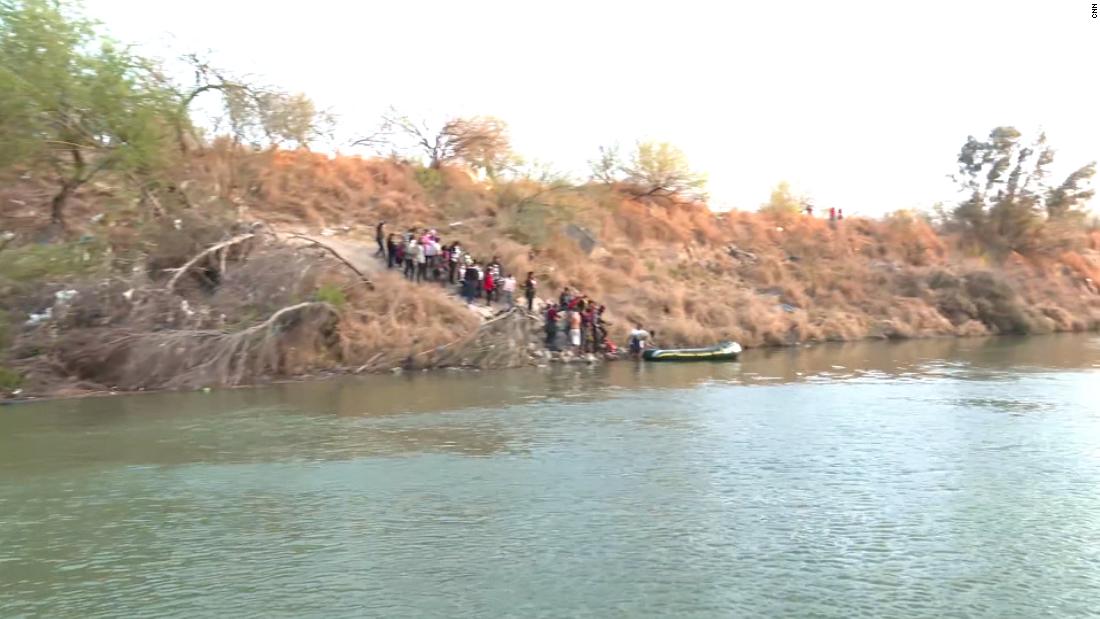
The sun set on Thursday over an all-too-familiar portrait of despair in the Rio Grande Valley. Some women carried whimpering babies, while others dragged bags of supplies to the edge of the muddy river, where a group of men with life jackets waited for them to cross in turn from Mexico to the United States. That day alone, authorities said, 2,000 migrants were rounded up in the valley.
“We come for another chance,” said a man traveling with his wife and young daughter.
US officials have attributed this rise in part to instability in the region exacerbated by the pandemic, and migrants’ perceptions of a more welcoming immigration policy under a new president.
‘We want to make a life here’
Roxana Rivera, 28, said she and her 6-year-old daughter left Honduras after the November hurricanes destroyed her home and everything in it.
Back home, Rivera said, the US was now allowing people with children to cross the border freely – which wasn’t quite true. She heard that on the news, she said. Relatives in the US passed on the same information. Other migrants had similar stories.
Rivera said she was delighted when the group she crossed the border with – mostly mothers and their children – was picked up by border agents. The migrants were processed and then taken to a bus station in Brownsville, Texas, where they were tested for Covid-19 and offered for release by nonprofits. She planned to stay with family in Houston while her immigration case is being handled.
“You always dream of living in a house with your kids,” Rivera said emotionally. “Now we have nothing … We dream of a house.”
Rivera said she sometimes regretted embarking on the long journey north on foot and by train, endangering her daughter’s life. Sometimes the girl asked for food and she had nothing to offer her. One time, she said, her daughter became dehydrated. Another time she had to seek medical attention in Mexico when her daughter had a fever.
Maria Mendoza, a 30-year-old migrant from El Salvador, appeared exhausted when she arrived in Brownsville after being processed by immigration officials. She hoped to reunite with relatives living in Maryland, she said through tears.
Mendoza recalled that the raft she and others used on a midnight crossing of the Rio Grande overturned, sending several mothers and their children into the water. She said there were days when she didn’t eat so her 6-year-old daughter wouldn’t go hungry. Her daughter remembered dodging a snake along the way.
“Above all, I want to be reunited with my family,” she said. “We want to build a life here. A better future for our children.”
‘We have nowhere to put people down’
Border agents encounter 4,000 to 5,000 people every day, according to a Homeland Security official.
“We’re full,” said Chris Cabrera, a spokesman for the National Border Patrol Council, who represents the Border Patrol agents. ‘We are overcrowded. We have nowhere to put people down. ‘
He added, “We’ve got them in our care and the system has crashed and there’s no place for us to send them.”
Unaccompanied migrant children are another part of the problem of the administration.
On Wednesday, the number of unaccompanied children in border patrol surveillance has reached more than 3,700, CNN has learned. Many are held in prison-like facilities along the border.
The Border Patrol detained nearly 800 unaccompanied migrant children on Wednesday – more than the current daily average of 450, according to a Homeland Security official.
About 8,800 unaccompanied children are in custody of the US Health and Human Services, the department confirmed Thursday, up from about 7,700 the previous week.
‘The border is not open’
Roberta Jacobson, Biden’s coordinator for the southern border, said the government’s message to migrants is now not the time to come.
“It’s really important that people don’t take the dangerous journey, that we offer them alternatives to taking that journey because it’s not safe along the way,” she said on Wednesday.
“And so, you know, if I could just emphasize … it’s really important that that message gets out, because the perception is not the same as reality in terms of the border not being open.”
Jacobson echoed the government’s message: “The border is not open.” She said the Trump administration’s immigration policies deliberately made things worse.
“We can’t just undo four years of the previous administration’s actions overnight,” Jacobson said, adding that it will “take a long time to overcome” the effects of Trump’s immigration policy. .
Still, the way the new administration is handling the situation has been criticized by Republicans and some Democrats.
Other than unaccompanied children awaiting immigration cases, the Biden government has continued to reject most migrants. Some families are admitted to the US on a case-by-case basis. An amendment to Mexican law prohibiting the detention of small children has prevented US immigration officers from expelling migrant families.
In Brownsville, Sandra, 38, said she fled Honduras after years of threats from a family member. Her full name is not published because she is a victim of domestic violence. One day, she said, the relative came to her house with a gun and opened fire. One of her sons and other relatives took the man and prevented him from killing her.
She lived with her son in a tent town on the Mexican side of the border – where she taught kindergarten students – and is now awaiting an asylum application in the US.
For now, a woman who runs a charity in Brownsville has opened up her home to Sandra and her young son. She learned this week that she will have an immigration hearing in June. Sandra wiped away her tears and said she will never return to Honduras.
“I had to go forever,” she said. “I cannot live in my country.”
CNN’s Ray Sanchez, Priscilla Alvarez and Geneva Sands contributed to this story, and Sanchez wrote in New York.